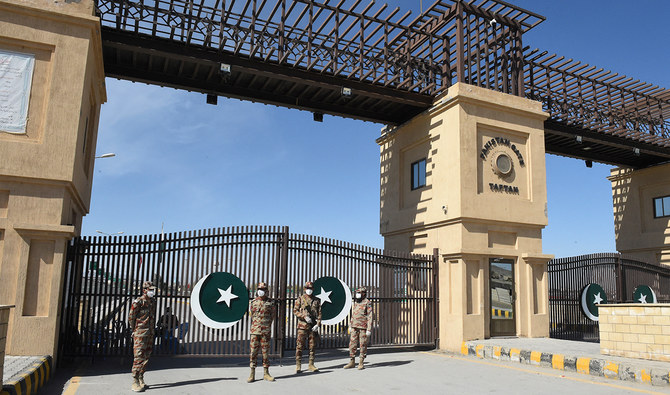QUETTA/ISLAMABAD: Iranian drone strikes in southwestern Pakistan sparked an unusual dispute between the neighbors on Wednesday, as Islamabad announced it would recall its ambassador from Tehran and suspend all “high-level” visits between the two countries.
The announcement comes a day after Pakistan said Iran had violated its airspace and attacked a border village, killing two children and injuring three women.
Reports about the attack were first published by Iranian media, with Nournews, affiliated with the country’s top security body, saying Iran had attacked militant bases in Pakistan’s southwestern Balochistan province. The target of the attack was allegedly the Jaish Al-Adl militant group that Iran accuses of mounting attacks on Iranian security forces in the border area with Pakistan.
On Tuesday, Pakistan’s foreign office said it had lodged a “strong protest” with Tehran and summoned the head of the Iranian mission in Islamabad to the foreign ministry. But on Wednesday, it escalated its response and announced it would call back its envoy.
“We have also informed them that Pakistan has decided to recall its ambassador from Iran and that the Iranian Ambassador to Pakistan who is currently visiting Iran may not return for the time being,” Foreign Office Spokesperson Mumtaz Zahra Baloch told reporters in a briefing on Wednesday.
“We have also decided to suspend all high level visits which were ongoing or were planned between Pakistan and Iran in coming days.”
Baloch said Iran’s attack was a violation of international law, calling it “completely unacceptable.”
“Pakistan reserves the right to respond to this illegal act,” the spokesperson warned. “The responsibility for the consequences will lie squarely with Iran.”
Iran’s Foreign Minister Hossein Amir-Abdollahian said at the World Economic Forum in Davos that Iran struck an “Iranian terrorist group,” saying that Pakistani nationals were not targeted in the assault.
Separately, Caretaker Foreign Minister Jailil Abbasi Jilani told Abdollahian in a telephonic conversation later on Wednesday that the attack has caused “serious damage” to bilateral ties between the two states.
“Expressing Pakistan’s unreserved condemnation of the attack, the Foreign Minister added that the incident has caused serious damage to bilateral ties between Pakistan and Iran,” the foreign office said.
Jilani said the attack was a “serious breach” of Pakistan’s sovereignty and a violation of international law and the spirit of bilateral ties between the two countries.
“The Foreign Minister underlined that unilateral actions could seriously undermine regional peace and stability,” the foreign office said. “No country in the region should tread this perilous path.”
On Monday, Iran’s elite Revolutionary Guards also attacked targets in Iraq and Syria with missiles.
Pakistan has a complex relationship with Iran, with which it shares a long border rife with cross-border militant activity. Relations between the two neighbors are often strained as both sides accuse each other of not doing enough to stamp out militants allegedly sheltering across the border.
“CRIMINAL ATTACK“
Abdul Hameed, the in-charge of the paramilitary Levies group in Balochistan’s Panjgur area where the attack took place, said drones were used to target homes in Koh-e-Baz, a tiny village of a handful of houses some 70 kilometers away from Panjgur city and around 40 kilometers from the mountainous Pak-Iran border. He said the attack took place at 530pm on Tuesday, killing two children between the ages of 7 and 10 and injuring three women who were inside a mud house.
“The Iranian forces launched the attacks with drones, because people in the area said they first heard the sound of the drone flying over them and then the missiles struck their houses,” Hameed told Arab News.
In a statement released on Wednesday, Jaish Al-Adl said Iran’s Revolutionary Guards had attacked the houses of a number of its members with drones and rockets.
The statement did not specify the exact location of the assault but said it took place “in the border mountains of Balochistan.”
“In this criminal attack, two minor children were martyred and two women and a teenage girl were seriously injured,” the group said.











